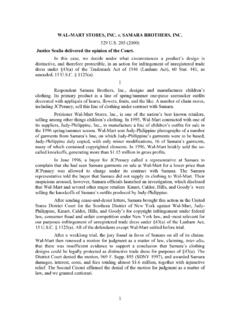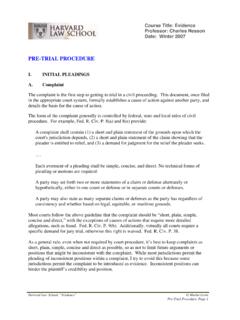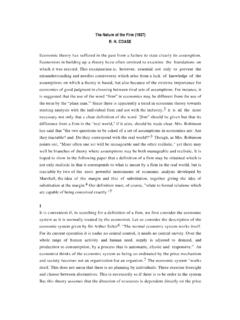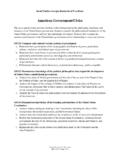Transcription of THEORIES OF INTELLECTUAL PROPERTY - Harvard University
1 1 THEORIES OF INTELLECTUAL PROPERTY William Fisher* The term INTELLECTUAL PROPERTY refers to a loose cluster of legal doctrines that regulate the uses of different sorts of ideas and insignia. The law of copyright protects various original forms of expression, including novels, movies, musical compositions, and computer software programs. Patent law protects inventions and some kinds of discoveries. Trademark law protects words and symbols that identify for consumers the goods and services manufactured or supplied by particular persons or firms. Trade-secret law protects commercially valuable information (soft-drink formulas, confidential marketing strategies, etc.)
2 That companies attempt to conceal from their competitors. The right of publicity protects celebrities interests in their images and identities. The economic and cultural importance of this collection of rules is increasing rapidly. The fortunes of many businesses now depend heavily on INTELLECTUAL - PROPERTY rights. A growing percentage of the legal profession specializes in INTELLECTUAL - PROPERTY disputes. And lawmakers throughout the world are busily revising their INTELLECTUAL - PROPERTY Partly as a result of these trends, scholarly interest in the field has risen dramatically in recent years. In law reviews and in journals of economics and philosophy, articles deploying " THEORIES " of INTELLECTUAL PROPERTY have proliferated.
3 This essay canvasses those THEORIES , evaluates them, and considers the roles they do and ought to play in lawmaking. I. A Preliminary Survey Most of the recent theoretical writing consists of struggles among and within four approaches. The first and most popular of the four employs the familiar utilitarian guideline that lawmakers beacon when shaping PROPERTY rights should be the maximization of net social welfare. Pursuit of that end in the context of INTELLECTUAL PROPERTY , it is generally thought, requires lawmakers to strike an optimal balance between, on one hand, the power of exclusive rights to stimulate the creation of inventions and works of art and, on the other, the partially offsetting tendency of such rights to curtail widespread public enjoyment of those creations.
4 A good example of scholarship in this vein is William Landes' and Richard Posner's essay on copyright law. The distinctive characteristics of most INTELLECTUAL products, Landes and Posner argue, are that they are easily replicated and that enjoyment of them by one person does not prevent enjoyment of them by other persons. Those characteristics in combination * This essay has benefited substantially from the comments of Charles Fried, Paul Goldstein, Jim Harris, Ned Hettinger, Edmund Kitch, Ed McCaffery, Stephen Munzer, Samuel Oddi, Penner, Scherer, Seanna Shiffrin, John T.
5 Sanders, Stewart Sterk, and a generous group of anonymous outside readers. 1 The history of these doctrines in the United States -- and possible reasons for their growing importance -- are considered in William Fisher, Geistiges Eigentum ein ausufernder Rechtsbereich: Die Geschichte des Ideenschutzes in den Vereinigten Staaten, in Eigentum im internationalen Vergleich (G ttingen: Vandenhoeck & Ruprecht, 1999) (available in English at ). 2 create a danger that the creators of such products will be unable to recoup their "costs of expression" (the time and effort devoted to writing or composing and the costs of negotiating with publishers or record companies), because they will be undercut by copyists who bear only the low "costs of production" (the costs of manufacturing and distributing books or CDs) and thus can offer consumers identical products at very low prices.
6 Awareness of that danger will deter creators from making socially valuable INTELLECTUAL products in the first instance. We can avoid this economically inefficient outcome by allocating to the creators (for limited times) the exclusive right to make copies of their creations. The creators of works that consumers find valuable , for which there are not, in the opinion of consumers, equally attractive substitutes will be empowered thereby to charge prices for access to those works substantially greater than they could in a competitive market. All of the various alternative ways in which creators might be empowered to recover their costs, Landes and Posner contend, are, for one reason or another, more wasteful of social resources.
7 This utilitarian rationale, they argue, should be -- and, for the most part, has been -- used to shape specific doctrines within the field. 2 A related argument dominates the same authors' study of trademark law. The primary economic benefits of trademarks, they contend, are (1) the reduction of consumers' "search costs" (because it's easier to pick a box of "Cheerios" off the grocery shelf than to read the list of ingredients on each container, and because consumers can rely upon their prior experiences with various brands of cereal when deciding which box to buy in the future) and (2) the creation of an incentive for businesses to produce consistently high-quality goods and services (because they know that their competitors cannot, by imitating their distinctive marks, take a free ride on the consumer good will that results from consistent quality).
8 Trademarks, Landes and Posner claim, also have an unusual ancillary social benefit: they improve the quality of our language. By increasing our stock of nouns and by creating words or phrases that people value for their intrinsic pleasingness as well as their information value, they simultaneously economize on communication costs and make conversation more pleasurable. To be sure, trademarks can sometimes be socially harmful -- for example by enabling the first entrant into a market to discourage competition by appropriating for itself an especially attractive or informative brand name.
9 Awareness of these benefits and harms should (and usually does), Landes and Posner claim, guide legislators and judges when tuning trademark law; marks should be (and usually are) protected when they are socially beneficial and not when they are, on balance, deleterious. 3 The second of the four approaches that currently dominate the theoretical literature springs from the propositions that a person who labors upon resources that are either unowned or held in common has a natural PROPERTY right to the fruits of his or her efforts and that the state has a duty to respect and enforce that natural right. These ideas, originating in the writings of John Locke, are widely thought to be especially applicable to the field of 2 William Landes and Richard Posner, "An Economic Analysis of Copyright Law," Journal of Legal Studies 18 (1989): 325.
10 This argument is derived in substantial part from Jeremy Bentham, A Manual of Political Economy (New York: Putnam, 1839); John Stuart Mill, Principles of Political Economy, 5th ed. (New York: Appleton, 1862); and Pigou, The Economics of Welfare, 2d ed. (London: Macmillan & Co., 1924). 3 William Landes and Richard Posner, "Trademark Law: An Economic Perspective," Journal of Law and Economics 30 (1987): 265. Other works that address trademark law in similar terms include Nicholas Economides, The Economics of Trademarks, Trademark Reporter 78 (1988): 523-39 and Daniel McClure, Trademarks and Competition: The Recent History, Law and Contemporary Problems 59 (1996): 13-43.











